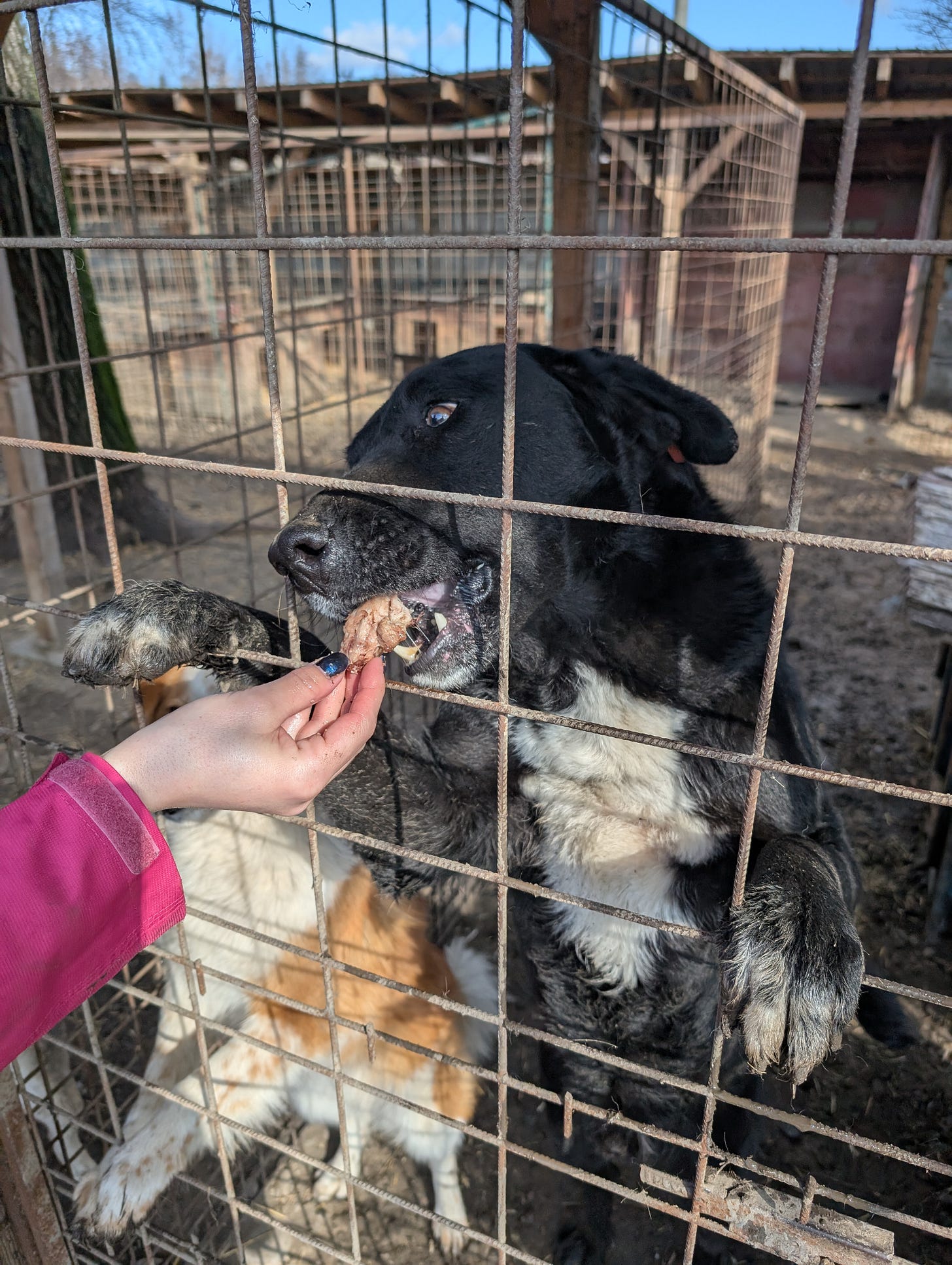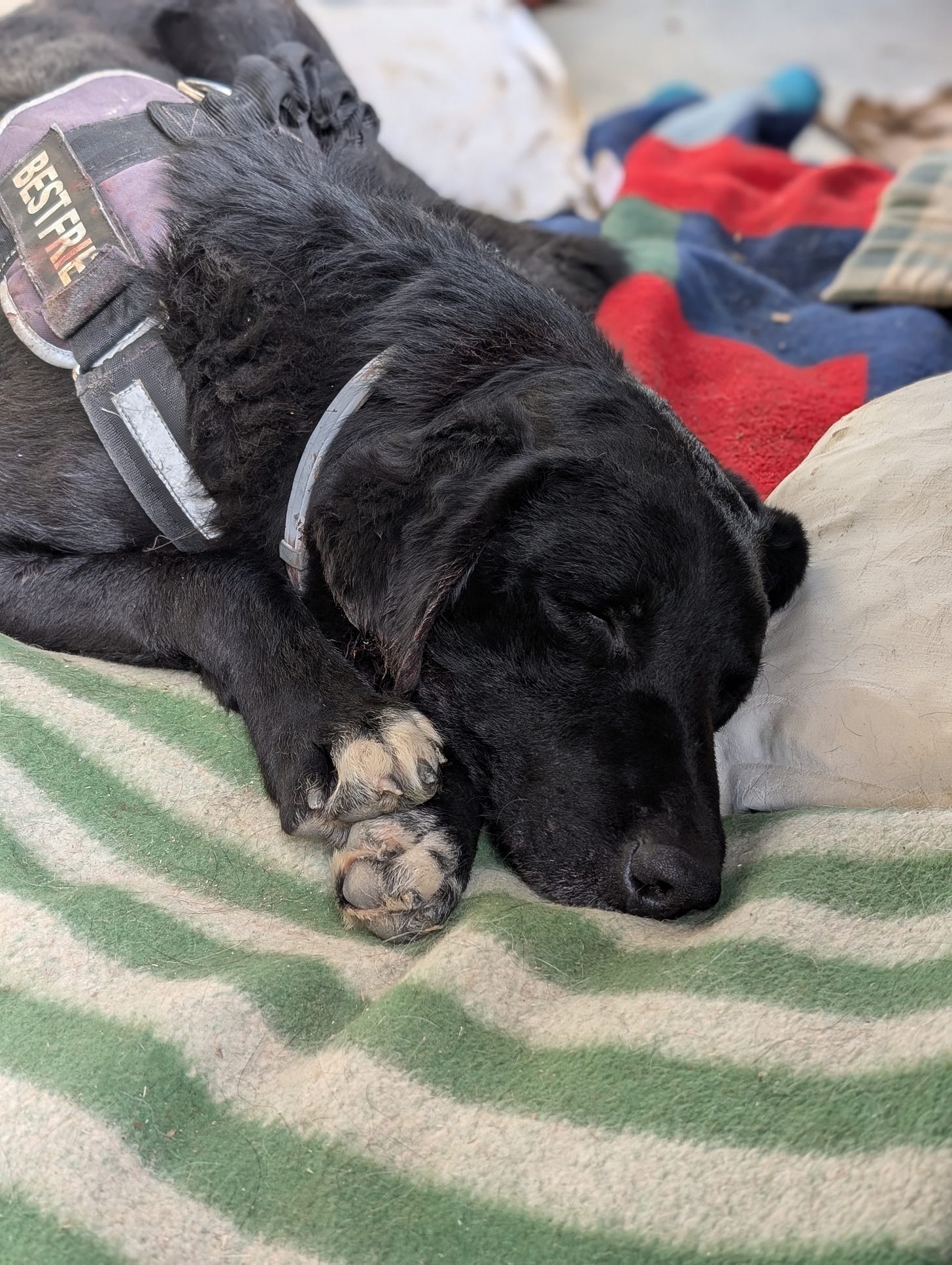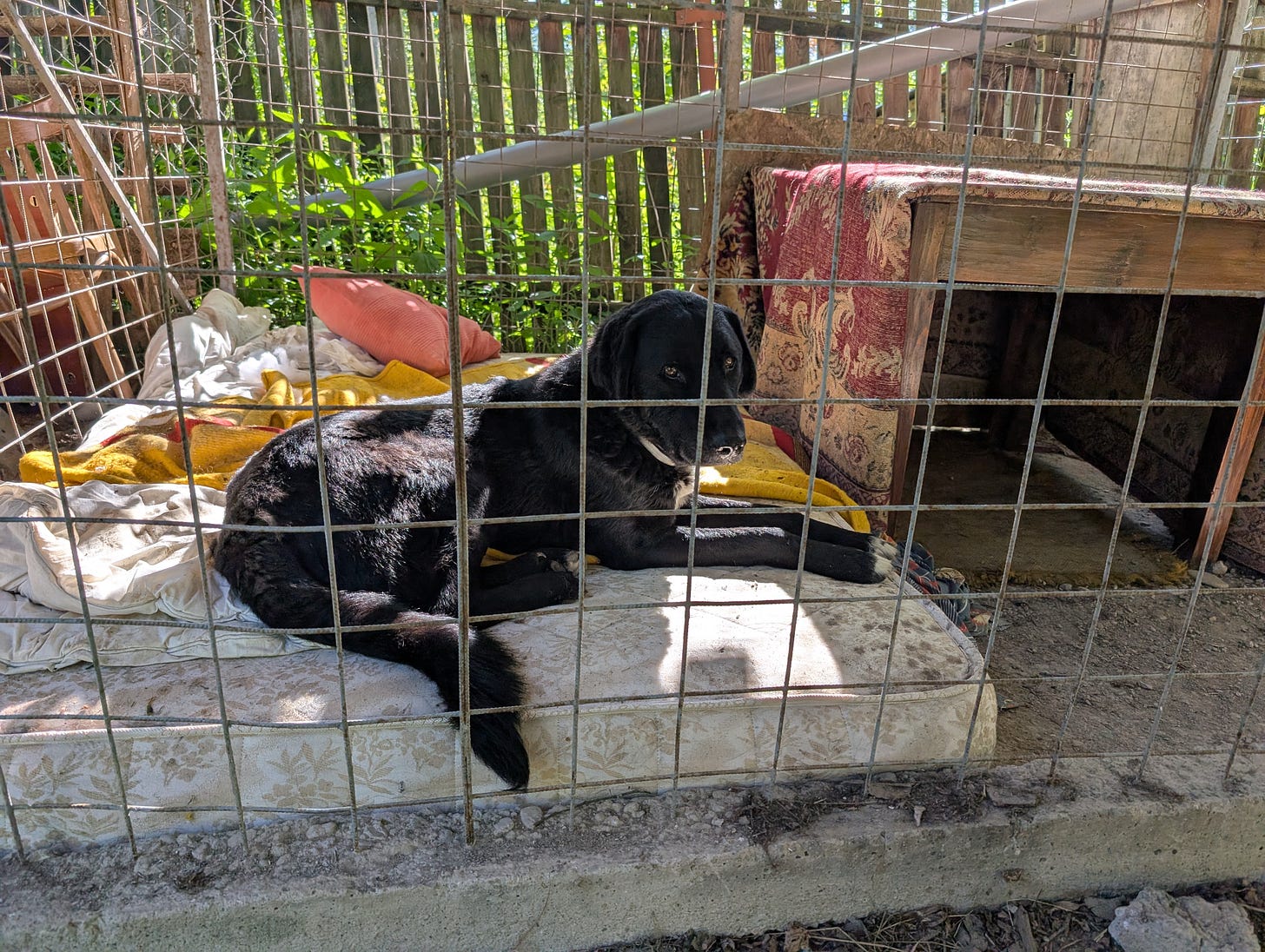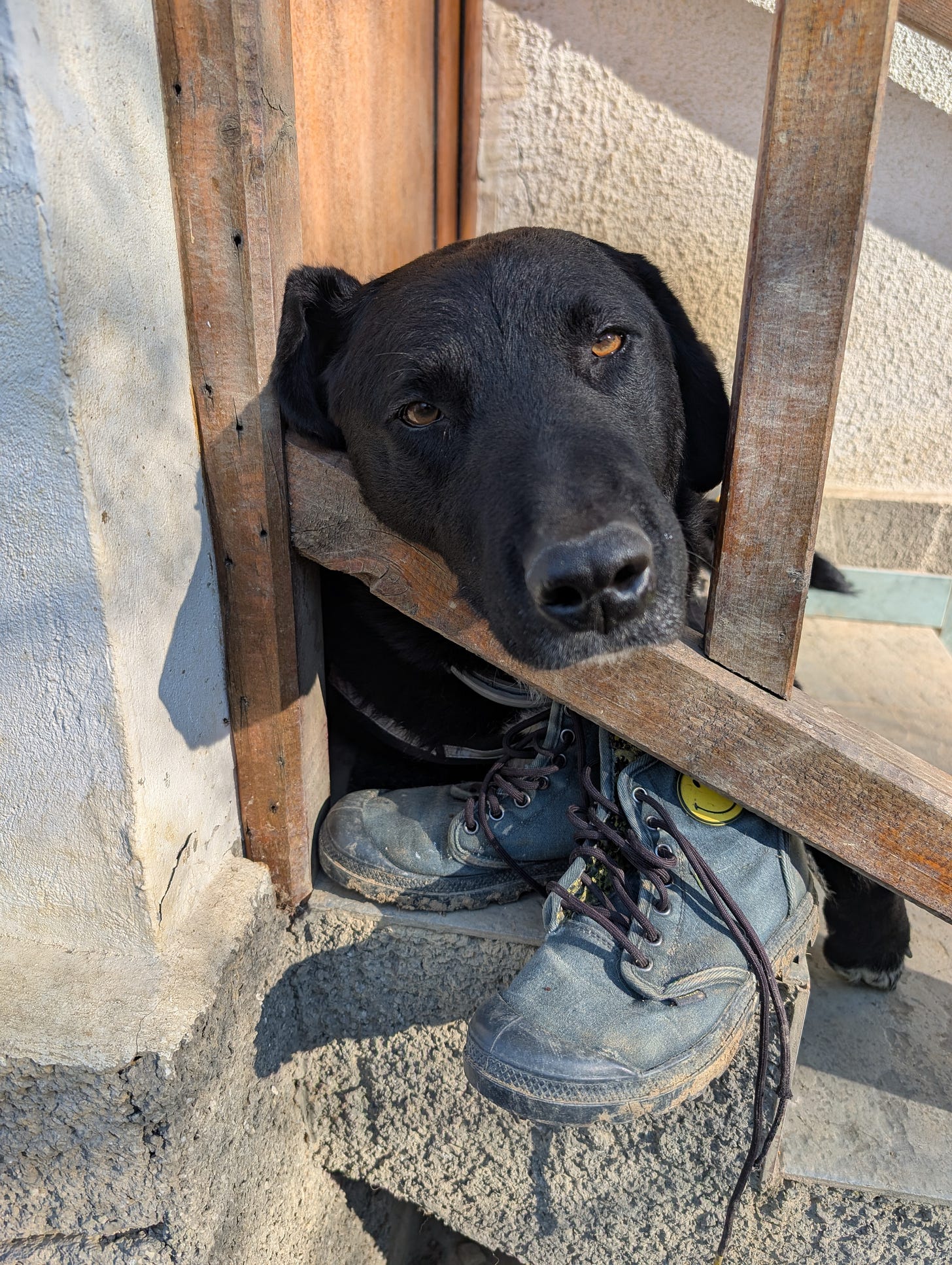As I heard the crunch from the plastic tank I was using as a temporary compost bin, I knew the battle was lost. Despite my efforts to cover it with old pieces of particle board and disassembled furniture, despite my attempts to block access to it with every log and tree branch I could carry, Dor got into the compost. It was our fault, really, we made the mistake of throwing some chicken bones in with the bits of fruits, vegetables, and yard trimmings. Lesson learned.
Dor was a street dog for the first few years of his life. Or at least he was a street dog when he was picked up and brought to the shelter. Now likely six years old, we're unsure of exactly how much time Dor spent on the street and how much time he spent in a small enclosure in the shelter. We figure it may be a 50/50 split, but Dor's time in a cage certainly didn't dull his street senses.
Constantly on the lookout for food and free space, Dor became somewhat of an escape artist at the shelter. We don't know exactly how many times Dor escaped his enclosure, but we know it was many times indeed. Dor would also fight with his cell mates, and when making our weekly trips to the shelter to feed the five hundred or so dogs some home cooked chicken, we'd occasionally find a gash on his nose or some other yet unhealed wound.
It was on one of her many trips to the shelter, long before I entered the picture, that my partner fell in love with Dor and promised to one day give him a better home. And one day, when space and circumstance permitted, we did exactly that. We drove to the shelter, escorted an admittedly reluctant Dor into the car, and brought him home.
Dor is a word that doesn’t easily translate from Romanian to English. In Romanian, someone would say “mi-e dor de tine,” whereas the closest English equivalent would be “I long for you.” And that would be how Dor got his name, as week after week Dor's mom would visit the shelter, promising the sweet boy he would have a good home as soon as possible, longing for him to have a better life.
Dor showed us instant trust; but he was wild and unpredictable. Slow to let go of his street dog instincts we'd occasionally find Dor burying his food and treats despite the constant supply we'd provide him with. Dor would also spend much of his time poking and prodding our fence for weak spots, continuing the escape attempts he was notorious for in the shelter. The problems, though, didn't end there: Dor didn't get along with our other dogs. Bringing him into a flock of four we knew we'd have to be patient with integration and set up a temporary enclosure. With no desire to bring Dor from one cage in the shelter to another cage at our home, we set about tediously swapping our dogs back and forth, allowing Dor free reign of the yard when the other kids were inside, and keeping Dor safely enclosed when the other kids wanted out. It was, and still is, an exhausting process.
Our hope was that Dor would eventually make friends with everyone, but in retrospect that was perhaps a bit optimistic. Dor, a big, black male, doesn't get along with Floki, another big, black male a year or two his senior and anything but the shelter-dog-scrawny that characterizes Dor. Though our attempts to gradually introduce them showed initial progress, fights soon broke out, and we worried Dor's temporary enclosure would become permanent.
And then one night, the unexpected happened, and our home was invaded. You can read that story here. Dor, at first, was understandably aggressive towards this home invader. I'll admit I had to pull his teeth off her throat on a couple of occasions, especially if there was food nearby. But slowly Dor softened, and what seemingly started as aggression soon turned to very rough play, and then slightly less rough play.
Dor, you see, despite his age, never learned how to play. Completely oblivious in the presence of a ball or frisbee, the only bit of playfulness I'd ever see from Dor came via the occasional chase through the yard. Either me chasing him, or him chasing me. Like a puppy learning everything for the first time, Dor is now learning how to play with another dog, and how to form a bond rather than fight with another dog.
This story, though, is far from over; it's only beginning. Dor has made incredible progress in the two months or so since we brought him home: He no longer buries his food, he no longer looks for escape routes, and he's even started responding to his name. That said, Dor still doesn't get along with Floki, and with two dogs now in the yard we need to find a way to make them both comfortable and safe.
You know the pitch that's coming, and you know we need some help. What started as a whim has now become a calling with the arrival of our home invader and many more dogs on the street who desperately need love and a good home. We're creating a refuge, and giving space to the street dogs who have already found their way to us and to the ones who will come in the future. Our first step is to build a large enclosure within our yard, a space where Dor, the home invader, and likely a few more dogs will have ample space to run around and play when they're not roaming the rest of the yard, and a place where they'll each have their own shelter and soft place to lay. We've got a GoFundMe going, but we still need help to reach our goal and to spread the word.
In the meantime Dor and the home invader are living their best lives, eating the best food we can afford, and enjoying as much roaming time as possible without depriving the other kids. It's a tough balance, and a whole lot of work, but these dogs deserve it. Please subscribe and stay tuned for more updates and more dog stories, and please share this post as well as our GoFundMe so that we can save as many street dogs as possible. Thank you all for the kind support we’ve received so far, you’re wonderful and we appreciate you!









First off. I had a total of six dogs spread out over 25 years with roughly 10 of those years as master of a pack of four. I was Papa Alpha. If I had to leave home, the dogs were segregated. Just like you should never leave a dog alone with a child, I didn’t trust them to behave when Papa wasn’t around.
My first was a Welsh Terrier I purchased from a breeder. He became the extended family therapy dog. My parents had an Airedale who thought she was a human and so was very aggressive with other dogs. They got a German Shepherd who spent formative puppy months alone in a basement in a crate during an ugly divorce. Now he meets this psycho Airedale…the situation at my parents was one of detente at best.
I came down for a visit and Frankie’s first challenge was to break the ice with the Sheperd. He too didn’t know how to play or bound. Before long he and my guy were chasing and wrestling. Then he went to work on the Airedale and before long even she came around. After that long weekend the two dogs got along like normal playful dogs.
Frankie then did his therapy on my sisters sheperd as well when we visited them.
Good job giving this poor boy a forever home.
Thank you for what you are doing, Gill. You are a true hero.